Your next browser, why does it have to be a browser?
![]() 11/26 2025
11/26 2025
![]() 467
467

It's not about adding AI to the browser, but making the browser AI.
Author I Wang Bin
Cover I Let the Bullets Fly
QianWen is accelerating its integration into Alibaba's ecosystem. Following the success of the QianWen app, Quark announced today (November 26th) that Alibaba's QianWen has been deeply integrated with the new Quark AI Browser, attempting to extend QianWen's momentum to desktop productivity scenarios.
Now, the desktop version of Quark AI Browser has deeply integrated the QianWen model, covering numerous application scenarios such as search dialogues, web browsing, and content summarization. External analysts believe this is a key move in Alibaba's 'QianWen Project,' aiming to make the browser the core carrier of QianWen's capabilities in the next phase.
It must be said that Alibaba is on the right track. The strongest model should be connected to the most imaginative C-end entry point.
In the AI era, the performance of models directly affects the number of users. The fact that the QianWen app garnered over 10 million downloads within seven days of its public beta test is sufficient proof of this.
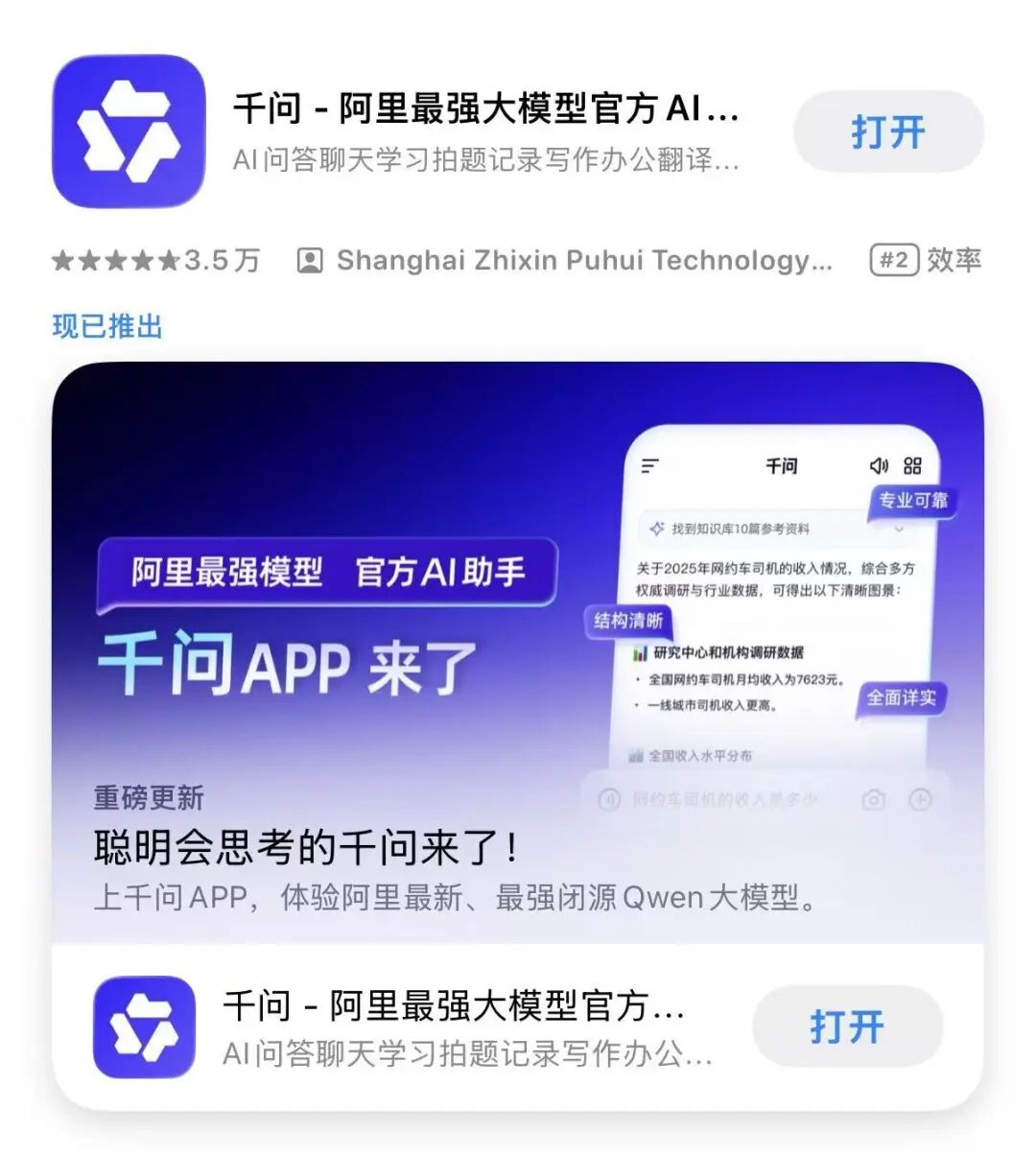
QianWen APP
The core of an AI browser is its underlying model. When OpenAI founder Sam Altman launched the Altas browser, he repeatedly emphasized, 'This is an AI-driven browser with ChatGPT at its core.' The implication is that seamless integration with ChatGPT is Altas's biggest selling point. As one of the most powerful top-tier models in the current global market, QianWen also needs a true desktop entry point.
People's entry points for going online on the desktop have never changed, and the browser remains the true carrier of workflows. Only by integrating QianWen into Quark can it truly enter the scenarios that users use daily, cannot live without, and are most likely to form stickiness.
Both OpenAI and Perplexity have accumulated a sufficiently large user base in dialogue and search scenarios, but they have never given up on pursuing browser entry points. They are attempting to reshape users' online experiences with more aggressive and disruptive AI Agent models, allowing AI to directly manipulate web pages and help users complete tasks. In Sam Altman's words, AI browsers represent a once-in-a-decade opportunity to rethink what browsers should be.
The problem is that the AI Agent experience in most AI browsers is still far from smooth. Whether it's ChatGPT Atlas or Comet, users often have to wait a long time for the AI Agent to complete tasks, with some complex tasks taking even 20 minutes or more.
More commonly, although the Agent can execute instructions step by step, it often freezes midway, misjudges web page structures, or simply stops at a certain step and gives up. As a result, users have to frequently take over manually, and the experience is even worse than that of traditional browsers. Additionally, these Agent functions often require users to pay, exacerbating the gap between experience and expectations.
This is the true miniature (Chinese for 'microcosm') behind the lively facade of current AI browsers. Over the past six months, although the AI browser sector has seen frequent updates and many new players entering the field, no significant generational advantage has been formed, and it is difficult to shake Chrome's monopoly.
Microsoft began adding AI features to its Edge browser as early as 2023, but after two years, there has been little impact. According to Statcounter data, Chrome's market share has even increased over the past year, reaching a record high of 73.81% in October this year, while Edge has been losing users after updates.
Can the comprehensive integration of QianWen into Quark bring some new hope to the stalled AI browser sector?
The most notable difference at first glance when opening the Quark desktop version is the enhanced QianWen entry point. In addition to being able to ask QianWen questions directly below the homepage search box, a QianWen icon has also been added to the left side. From a product form (Chinese for 'form') perspective, Quark is closer to AI browsers like Comet and Atlas, while Chrome is more conservative.
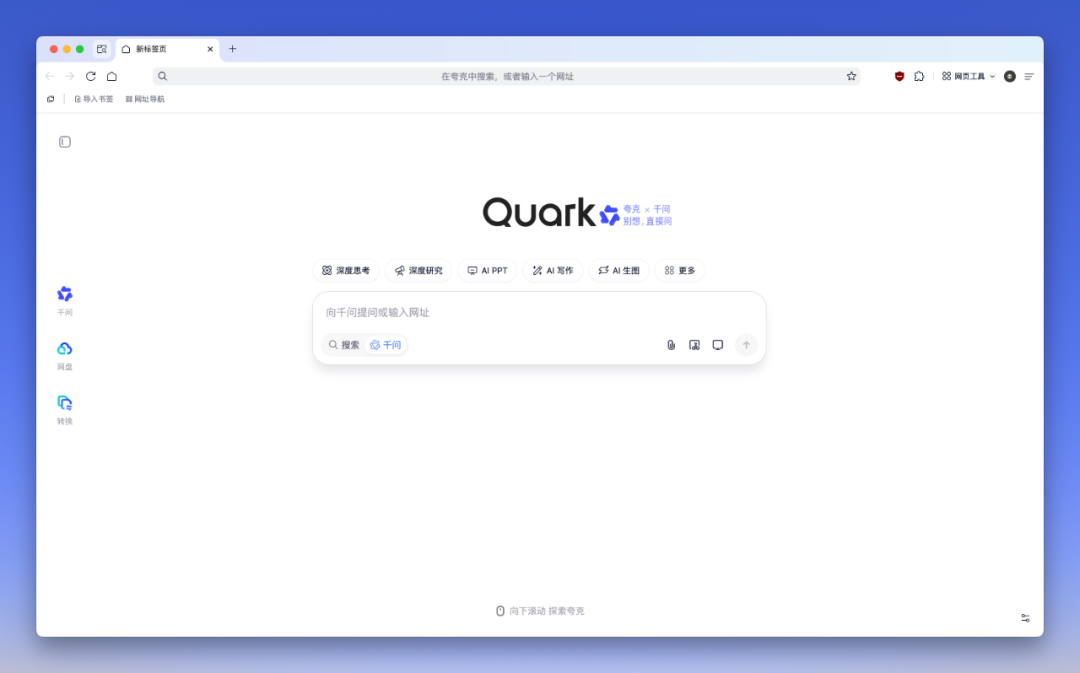
The brand-new Quark homepage
Most AI browsers emphasize the model's assistance in web browsing and summarization, with the AI assistant directly callable in the sidebar. Quark is no exception; now, when you open a webpage, you can call QianWen in the sidebar to ask questions.
For example, when opening an interview video of Google DeepMind's team with Sundar Pichai, you can ask QianWen to summarize and analyze the video content. Compared with Atlas and Comet, QianWen is significantly faster in response speed, and its summarization of the video content is more organized and structured. (Although Google has also added the Gemini assistant to Chrome, the activation conditions are too strict, limited to the US region and English language, so no comparison test was conducted.)
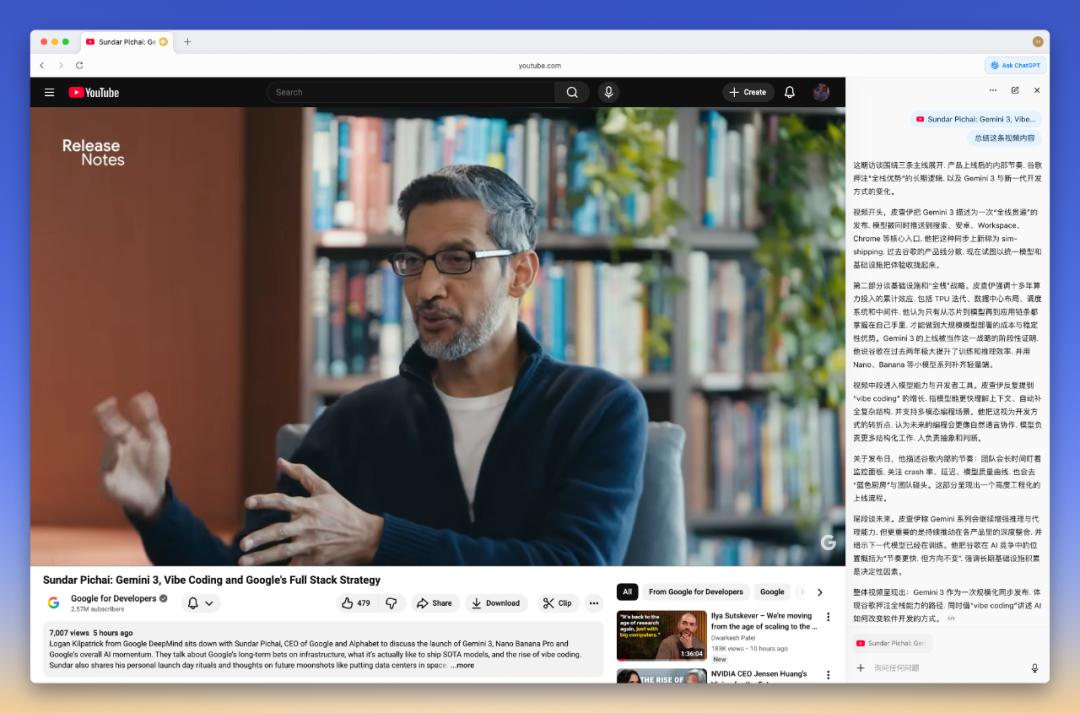
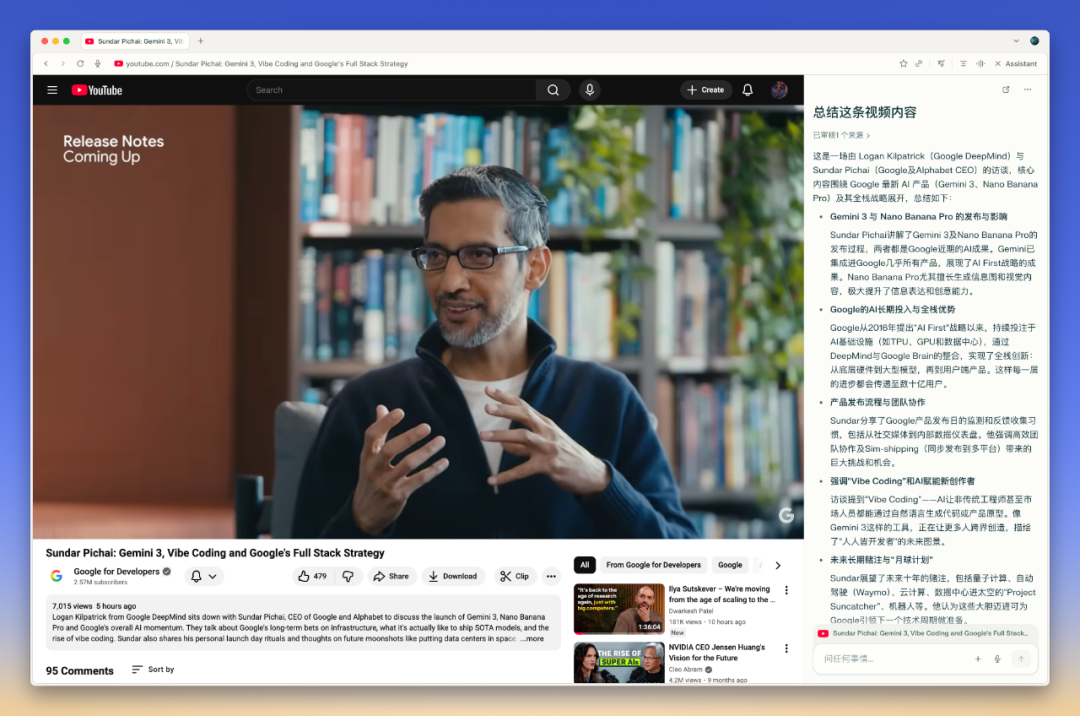
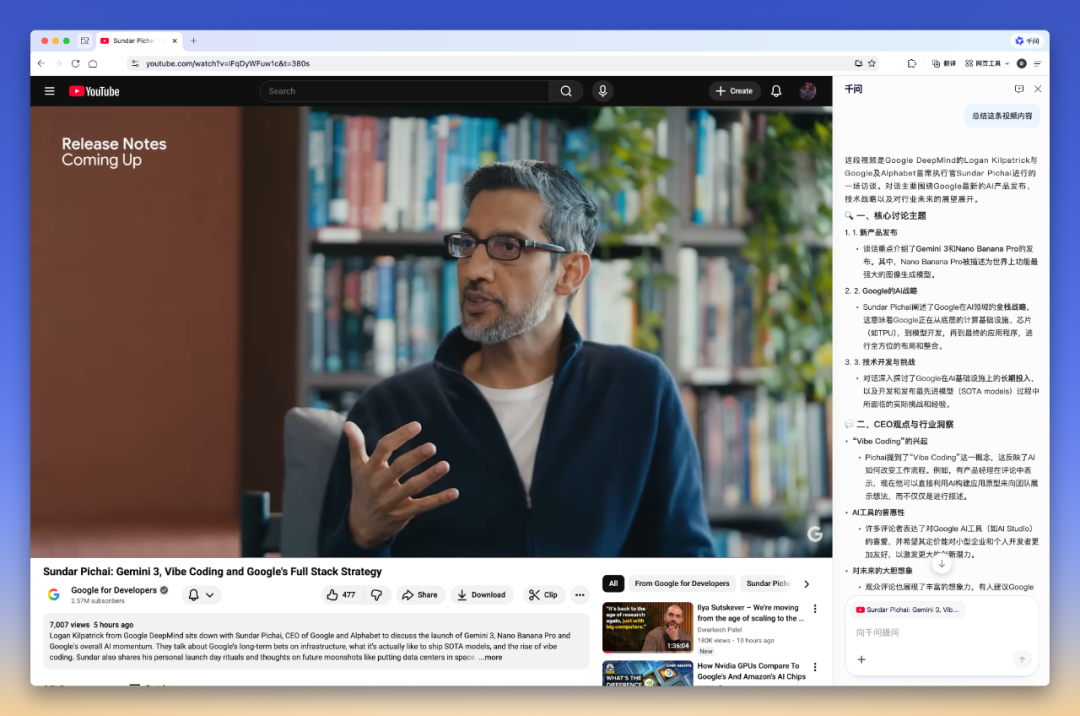
Summarization and analysis of YouTube videos by Atlas, Comet, and Quark
Compared with Atlas and Comet, which only analyze video content, QianWen also specially (Chinese for 'deliberately') summarizes audience comments in the comment section, analyzing viewers' opinions on Google AI. It even summarizes user feedback on Nano Banana's products and their desire to join Google.
When it comes to true productivity scenarios like paper reading, Quark has an even greater advantage. Most papers are published in PDF format, but most AI browsers simply apply the Chromium kernel without special optimization for PDF reading, resulting in a very rough reading experience. Quark, leveraging its previous document processing experience, has added a series of practical functions such as annotations, side-by-side translation, format conversion, and even cross-device transmission. Comparing the two, it's like the difference between a fully furnished apartment and a bare shell.

Quark reading PDF papers
QianWen's paper reading ability is further demonstrated. For the same 32-page technical paper published by OpenAI, QianWen provides a more comprehensive and detailed summary than ChatGPT. For example, QianWen systematically outputs summaries from multiple dimensions such as research background, training methods, experimental results, future directions, and technical limitations. Although ChatGPT also follows a technical research framework for output, its information density is significantly lower than QianWen's, making its technical explanations more vague.
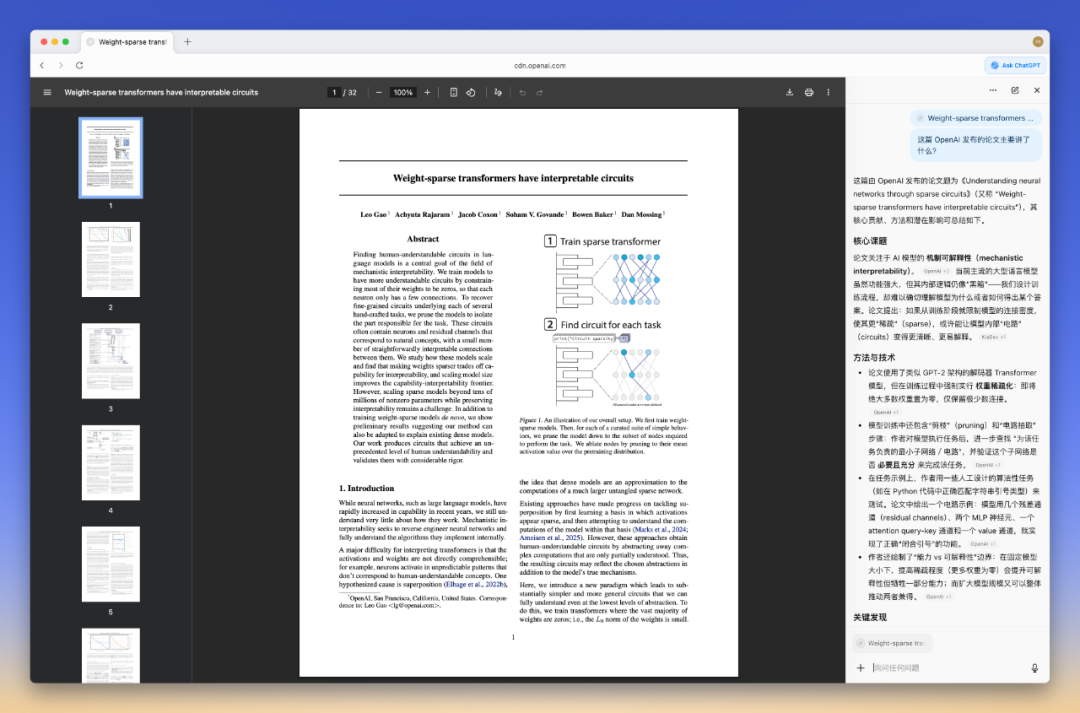
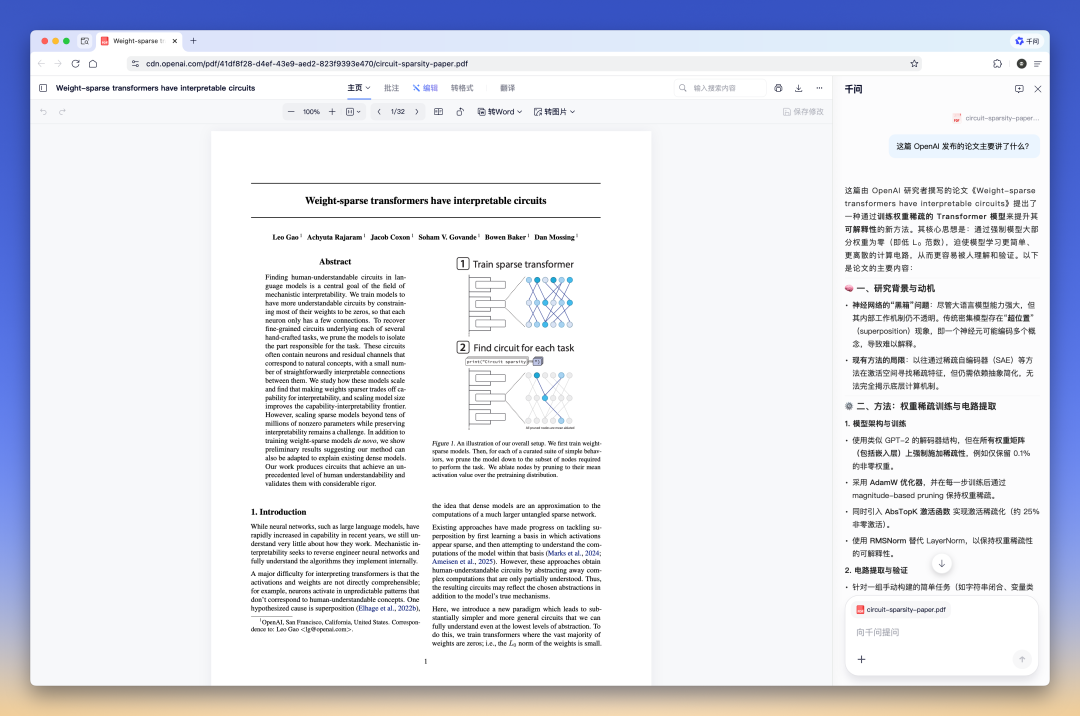
Comparison of paper reading between Atlas and Quark
As for Comet, it only outputs a brief summary of 800 words. In comparison, QianWen's output is 1616 words, ChatGPT's is 1426 words, and Comet falls far behind in length. Alibaba has indeed put a lot of effort into model performance.
However, these can still only be considered basic capabilities of AI browsers. In the past, many browsers could achieve similar effects by simply applying plugins, but Quark's integration with QianWen is more seamless. In fact, with these functional innovations alone, Atlas and Comet have not truly changed users' online habits.
OpenAI specifically added a badge system and exquisite guiding animations for Atlas, which are typically used in internet applications. However, online feedback on Atlas is mostly negative, with less response than the simultaneously launched Sora application. The Verge bluntly evaluated that Atlas feels like adding a few more steps to Google searches, with a disappointing start.
 Internet-circulated Atlas meme
Internet-circulated Atlas meme
A browser is an entry-level product with immense imagination space, but it is also one of the tools with the most stable user habits and highest migration costs. If only AI plugin-style innovations are made within the original product framework, it is difficult to break Chrome's long-standing monopoly.
Quark has thought more deeply about this. The browser is just the surface layer of Quark; what they want to do is not just an AI browser.
Specifically, in this comprehensive upgrade of QianWen's integration into Quark, you can not only call QianWen in the browser but also awaken (Chinese for 'awaken') QianWen in global mode through shortcuts or desktop floating balls. This breaks free from the constraints of the original browser framework, making QianWen a truly system-level AI assistant.

Awakening QianWen globally on the desktop
For example, you can directly call QianWen to ask questions, search, or even help you continue writing articles using shortcuts (Alt or Option + Space) while writing in Word or composing emails. You can even directly share applications or screens with QianWen or take AI meeting minutes directly during online meetings without switching windows or opening the browser.
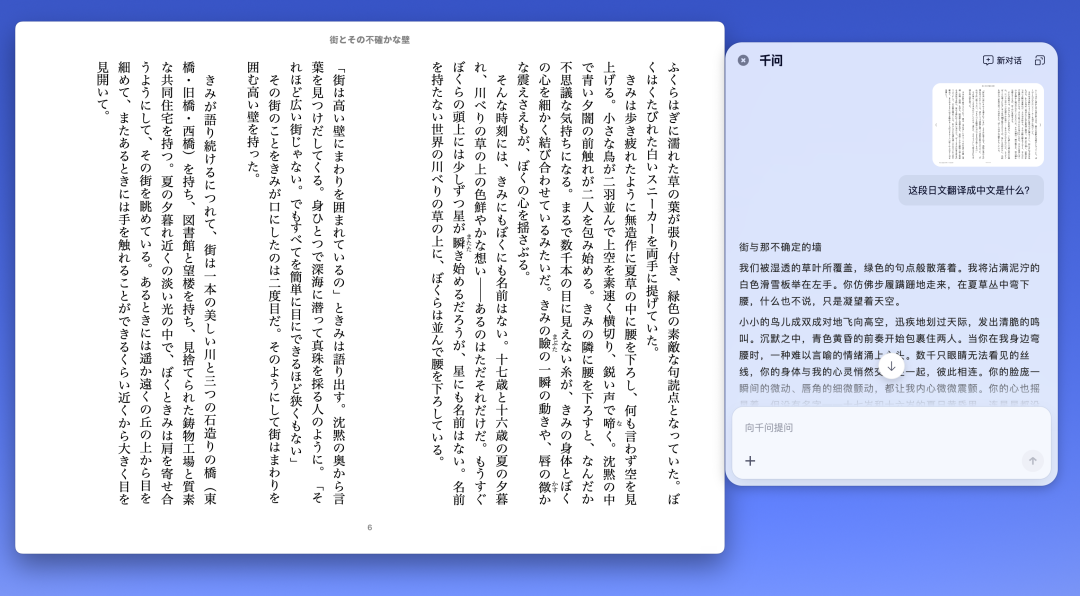
Using QianWen to screenshot and translate Haruki Murakami's novel
Quark names it the 'QianWen Intelligence Suite,' including six major functions: QianWen Screen Reading, QianWen Quick Box, QianWen Sidebar, QianWen Floating Ball, QianWen Word Selection, and QianWen Screenshot. It aims to make AI capabilities pervasive in high-frequency productivity scenarios such as searching, reading, document writing, and file processing.
To use a somewhat inappropriate metaphor, current AI browsers are more like standalone applications on mobile phones, requiring users to actively open them. Quark, on the desktop, is more like a system-level built-in capability, always on standby and ready to respond, truly integrating AI into daily workflows. Quark is not putting AI into the browser but making the browser itself AI. Any computer that downloads Quark can also enjoy the so-called AIPC experience.
OpenAI added global shortcut calling capabilities to ChatGPT's desktop version early on, attempting to make ChatGPT a system-level assistant. However, perhaps considering the conflict between the Atlas browser and ChatGPT, they did not add this function to Atlas.
Quark and QianWen do not have such restrictions. For Alibaba, the Quark browser serves as the core entry point for QianWen in productivity scenarios. With QianWen as the foundation, coupled with Quark's user base of hundreds of millions and its ecological layout in high-frequency productivity tools such as cloud drives, scanning, and documents, the imagination space for QianWen may be accelerated.
The 'QianWen Project' is regarded by Alibaba as the 'future battle for the AI era.' Their goal is to use QianWen to reshape all their businesses, with e-commerce, maps, office work, and all other scenarios being underpinned by QianWen's AI capabilities.
Quark's reconstruction on the desktop may be just the beginning. As Alibaba's core AI engine for C-end users, QianWen is gradually penetrating into all user-facing entry points of Alibaba, becoming the starting point for the reconstruction of the entire system.
© All rights reserved by Shanshang. Unauthorized reproduction is prohibited.







